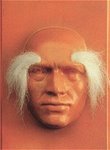
For today’s post, I’d like to continue to talk about stress and how it is vital to understand how it can affect a player’s decisions the poker table.
Consider this quotation from Samuel Johnson, English man of letters:
Fear is implanted in us as a preservative from evil; but its duty, like that of the other passions, is not to overbear reason, but to assist it.
As I take a moment to restore Sammy J to the bookshelf, try to contemplate just how it is possible to incorporate the wisdom from his eighteenth century scribbling at the twenty-first poker table.
It might also help to fill your head with the thoughts of Dave Grossmann, an ex army lieutenant colonel and author of ‘On Killing’, who has studied the effects of heart rate on performance. He discovered that there is an optimal range – from 115 to 145 beats per minute – that improves an individual’s performance. People’s senses are heightened; they have better powers of concentration and can disregard irrelevant information.
In a recent live poker tournament, my pocket nines made quads on the flop and I remember being conscious that not only had my heart rate increased, but that I was also less aware of the casino’s background noise. Obviously it was not a difficult hand to play, but I suspect that I was briefly in that optimal zone and, as a consequence, my poker skills were boosted.
It is a phenomenon supported by the words of basketball legend Larry Bird. He has said that at certain crucial stages during a match, he could not hear the roar of the crowd and the players would appear to be moving in slow motion. He was playing in the optimal range.
The problem is that few of can sustain that range and our bodies can become overstressed. If our heart beat reaches 175, we can go into shutdown: the mind perceives a threat and so begins to switch off bodily functions it doesn’t need. (At its most extreme, it is possible to lose control of one’s bowels.)The trick is to learn coping mechanisms.
When I flopped pocket nines, I was concerned that my heart beat would continue to soar so I mentally recited a song. It seemed to work but I suspect it would not suit everyone. We need a more universal scheme. One man that has developed the idea is Gavin de Becker, author of ‘The Gift of Fear’. He also runs a firm that provides security for high profile figures. As part of their training, he puts his bodyguards through a program of ‘stress inoculation’: he shoots them.
Obviously, not with a real gun.
However, they feel the force of the plastic marking capsule and it takes them by surprise. The stooge is allowed some recovery time and then, just at the point when they can function, they take one more to the chest. In total, the recruit is shot five times. As de Becker puts it, ‘By the fourth or fifth time you get shot, you’re okay’. At that point, the recruits are then asked to handle an angry dog.
On initial contact with the pooch, the recruit’s heart rate leaps to 175. ‘They can’t see straight. The second of third time, it’s 120 and they can function’. They can remain in their optimal range. (If this program causes you to think of the process of desensitisation, I would advise to you quash those thoughts, turn the TV on and return only when you are no longer so independently minded.)
I’m not convinced there are many people prepared to take five to the chest and attempt to handshake a hungry Rottweiler as part of a campaign to play better poker. However, if we could construct our own version of the ‘stress inoculation’ program, I’m sure we would become better players.
Here are my ideas so far:
1. Ask a friend to become a kind of urban sniper and attempt to ‘shoot’ you with a water jet at an unexpected moment, preferably when you are carrying a carton of OJ so you can feel like Don Corleone.
2. If that sounds severe, find someone who is happy to relate bad news to you on a constant basis. Soon the loss of a job/mortgage/limb will be bearable and you might take down a tournament.
As you can see, I won’t be contacting the poker publishers anytime soon.
However, there is a serious point here, one that illustrates why it is not possible to learn poker by playing for matchsticks. To become the best you can be at poker, you have to acknowledge your fear and then use it. It is wrong to say ‘No Fear!’ – it is an essential part of the game.
I will give some serious thought to how to manage stress at the table and will attempt to devise a proper inoculation program. I would also like to invite you to share any ideas on the topic and then between us we can swell the database of poker knowledge.
In the next post, I will discuss how, when you have managed to use your fear, you can begin to enjoy the perfect combination of intellect and intuition. Often, one is used at the expense of another.
Here is a quick example:
A bat and a ball set costs €1.10. The bat costs €1 more than the ball. How much is the ball?


No comments:
Post a Comment